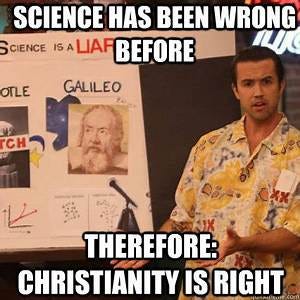Contrarianism Is Not Intellectualism
Jae's Perspective
I have talked about contrarianism in the past both here and on my Instagram page. Unfortunately, people online confuse being contrarian with being an intellectual. Contrarianism is simply a person who holds a contrary position against the majority, in the realm of science this is a person who is generally against the body of evidence or the scientific consensus.
This type of reasoning is fallacious in nature as a position held by the majority cannot be wrong merely because it is held by the majority. There needs to be strong justification as to why a certain position is wrong. When it comes to science this justification comes from what is known via empirical evidence, but the contrarian often rejects this evidence, favors weak evidence for their position, or rejects the idea of science all together.
I am personally fixated on this latter position as I have encountered numerous contrarians who contend they know how science “should” work. Therefore, their position is correct regarding the dismissal of vaccination, climate change, or the earth being round. However, the justifications given by contrarians regarding the nature of science, the scientific process, and scope of knowledge is faulty.
I will highlight three commonly placed arguments I hear and will attempt to refute each of them. They go as follows:
Science has been wrong before.
Science is all about asking questions.
But [insert here] said that is false and they have [insert here] background.
Science Has Been Wrong Before
I’ve heard this too sentence too many times to count. Typically the contrarian will highlight an instance where science has been wrong in the past to attempt to discredit it’s validity. Their argument sums up as, “If it was wrong before how do we know it’s not wrong now?”.
However, the argument contains a fatal flaw. We only know scientific theories, experiments, frameworks, etc. were wrong because of better science.
I constantly hear the “big tobacco” ploy, this is where contrarians attempt to point out the tobacco industry created a false conflict of interest by utilizing their own rendition of “science” in order to keep up the sell of cigarettes in the face of evidence which indicated their danger. But the issue is we know now cigarettes are connected to the development of lung cancer and various other health issues because of the overwhelming scientific evidence. The ploy by the tobacco industry clearly did not work to undermine the overwhelming scientific literature.
Contrarians would only know science was wrong because other scientist developed better methods, replicated experiments, received new data, and updated the outdated information in that field. Nothing outside of science can indicate that science was wrong in the past. Therefore, we cannot dismiss a scientific discipline merely because it was incorrect before as you would only know that if the discipline improved it’s knowledge base.
Nevertheless, stating “science was wrong before” does not mean it is wrong now and the fact we know science was wrong before showcases that the scientific process works.
Science Is All About Asking Questions
When a contrarian replies with “science is all about asking questions” the hidden meaning seems to be “my questions are valid for scientific inquiry”. I will first say science is more than “just asking questions” as we have to put those questions to the test via experimentation, something contrarians most likely do not do. Nonetheless, there are such things as answers to questions raised and outlandish questions we should not bother with.
It is fair to ask questions related to science and we should ask them. For example, in nutritional science we might ask, should we supplement omega 3 fatty acids into an infants diet? That’s a fair question related to infant development, our understanding of omega 3 fatty acids, and the body of evidence we have for nutritional needs of infants. However, an outlandish question would be… will my infant turn into a fish if I give them omega 3 fatty acids?
The latter question has no basis in reality or evidence, as far as we know taking omega 3 fatty acid supplements does not turn humans into fish. Therefore, this ridiculous question does not need to be subjected to serious scientific inquiry. This does not stop contrarians from raising irrelevant and nonsensical questions while acting like scientist somehow need to look into it. Not all questions are relevant to a topic, not all deserve to be looked into, not all questions need to be acknowledged, and there is no conspiracy suppression by scientist for not answering your question.
Still, I will concede some questions raised are relevant. Questions such as, are the COVID-19 vaccines are safe? But when the overwhelming evidence suggest they are, you and I as the nonexperts should accept those answers. Unfortunately, issues persist because contrarians tend not to ask questions with the intention of finding answers. They tend to ask questions to subvert the answers as they often do not conform to their worldview.
This relates to the common online trope of JAQing (Just Asking Questions) off and the troll tactic of sealioning. Contrarians tend to ask questions in an effort to overwhelm, they disregard strong evidence by moving goalpost, they often gish gallop, ask loaded questions, beg the question, and there seems to be a need for them to “debate” online. I typically get debate request from small accounts who want attention for their outlandish views but I do not indulge them.
Asking relevant questions is imperative in science but we ask questions in science to find actual answers not confirm our worldviews.
But [insert here] said that is false and they have [insert here] background
Contrarians are adamant about sending videos of questionable medical doctors or PhD’s proclaiming wacky conspiracies and falsehoods at school board meetings and on podcast. They fail to consider the fact we do not appeal to authority, but rather we defer to the experts and the body of evidence.
I’m not sure if anyone reading this has a background in academia, but from first hand experience it is difficult to get scientist to agree on stances within their field. This is why a scientific consensus on something such as vaccinations, climate change, GMOs, etc… is remarkable. When the general scientific community agrees upon a given finding or stance within their field this is due to the overwhelming amount of evidence in support of that finding or stance. Scientist did not arbitrarily come together to just agree on something, but they did put together a strong body of evidence to reach an appropriate conclusion of what is approximately the case.
Contrarians tend to have this fantasy understanding of the “maverick scientist” who changed an entire field but that is rarely the case. The scientific community is extremely collaborative, findings build off of one another, and you will rarely (if ever) work alone on a research project as a scientist. The fact a contrarian would try to imply otherwise showcases their lack of experience in the realm of science.
A scientific consensus could only be overturned by better evidence that goes against the consensus by experts in that field. For example, to overturn the medical disciplines understanding of germ theory one person would need to be an expert in microbiology, virology, immunology, infectious disease, possibly most medical specialties, epidemiology, and I’m sure more. One person simply does not have that amount of knowledge let alone a random person on the internet.
Since, most of us are not experts on these topics we should accept the consensus and the body of evidence on the topic. Being a contrarian does not make one an expert or intellectual, merely it is an easy method to feel special and intelligent on matters one is not.






